
Fishermen are fishing in the Lhasa River at dawn using leather boats. By Jogod
Sopa Village in Chushur County of Lhasa Municipality is the only village in Tibet with a fishing business. The unique culture of this village includes ancient traditional customs. One in particular is a strange marriage custom.
The village residents normally live in a single close-knit community; their main occupations are in the fishing business but they are also interested in some other side products, such as preparing hides.
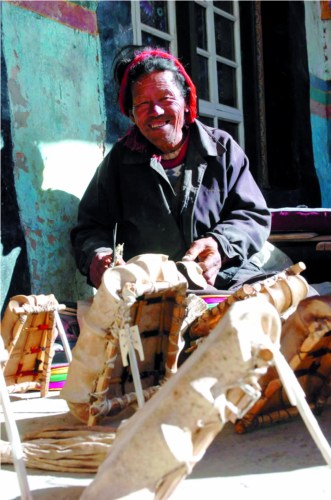
Old Benpa from Sopa Village is making models of leather rafts to give to visitors.By Jogod
In Tibet, whenever attending festivals or camping on the grasslands, youth is accustomed to catching all possible opportunities for love and romance.
However, this is not the case in Sopa Village; instead, girls and boys are not allowed to spend time together. For example, while camping, men are used to gathering together to enjoy food and music, but the girls sit separately to one side to frolic together. Such separation of entertainment between men and women is rarely seen in any other communities in Tibet.
Once engaged, the both families in Sopa Village must hold an engagement ceremony. The girl's family should firstly visit the boy's family, and then vice versa. Having become engaged, the girl and the boy can visit each other. For instance, the girl might visit the boy's house and assist the boy's mother to
do some house works. In return, the boy might also help the girl's family to do some labor work during the busy farming season. Nevertheless, the girl and boy would never be allowed a chance to get along with each other independently.
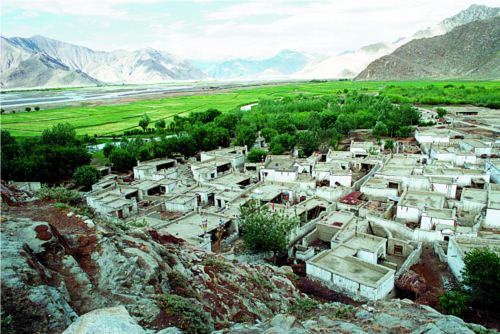
Panorama of Sopa Fishing Village in Chushur County.By Jogod
Once the engagement is declared, both families begin to talk about building a new house for them. Often, each family takes responsibility to build one and a half rooms??hree new rooms in total. Each family should also provide a Tibetan style cabinet and a table as well. Other furniture may also be given but that depends on the wealth of each family. Usually, the more wealthy family gives more. Neither family would care for how many the other one has given.
The miracle of the marriage custom in Sopa Village works like this: before a girl leaves home to marry, her family must first divide the family property with her sibling sisters and brothers evenly. She will bring the portion distributed to her to the boy's family.
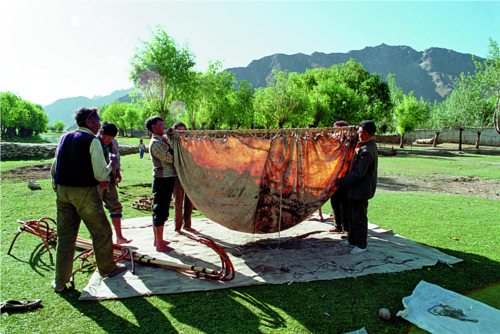
Fishermen from Sopa Village are busy making leather boats,locally recognized as the best quality.By Jogod
When everything is ready, the red-letter day is chosen for the marriage ceremony, following the procedure of a traditional Tibetan marriage ceremony. Then they new couple start to live together and begin their new lives.
In Sopa, brides can enter the groom's family after marriage or, vice versa, the groom can also enter the bride's family. No matter who enters into whose family, there is no any difference in their social status. In the village, I encountered Lobzang, a Sopa man who has married into Lhoka Preferture. He is living 60 kilometers away from Sopa Village. He told me he came back to see his parents. He still does the same things as he did before marriage, such as fishing in the river, preparing sheep hides and doing business. He keeps most of his profits for himself, and also gives a portion to his parents. I asked Lobzang:
"How long have you been back?"
"About twenty days,"
"When will go home?"
"In three months."
"Such a long time, and you should bring your wife,"
"We have a two-year-old son. She is busy taking care of him,"
"Do you miss her?"
"Sure I miss her and my son. Nevertheless, it is easier to earn money in Sopa Village, enabling us to have better lives."
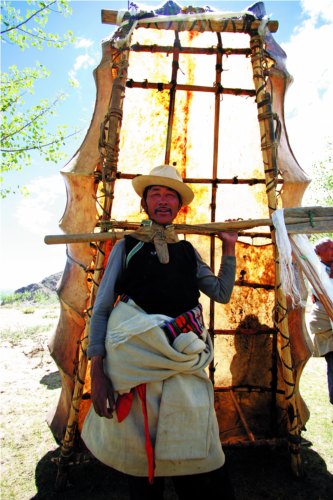
Boatman.By Kalzang Jigme
The families in Sopa Village are usually very stable, and it is surprisingly rare to have couple divorces. We interviewed the village administrator Sonam who said: "Our Sopa people have six 'do not's. They are, 'do not fight each other', 'do not curse people', 'do not lie', 'do not steal', 'do not gamble', and 'do not have affairs outside of marriage'. The villagers live in equality, and nobody mistreats others. Therefore, how could be possible for couples to devoice?"
Wherever we visited in the village, we found every household was living harmoniously; the elders were revered by youth and the couples were mutually respected. This was seldom seen elsewhere.
I asked Sonam: "All kids have married and moved out of their family. Who will take care for the elders?"
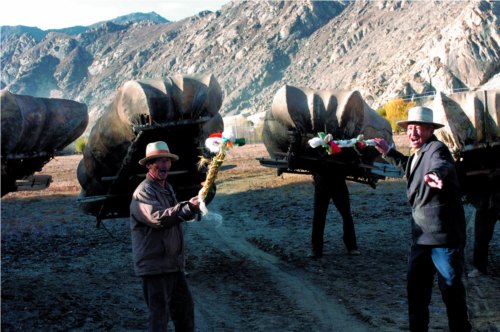
Men from Sopa Village dance,carring leather rafts on their backs,to celebrate the harvest.By Jogod
"If the parents cannot help themselves, they usually prefer to live with one of their kids, and the other children often provide financial support or materials in order to help the elders." Sonam said.
When we asked about the reproduction situation of women of fertile age, Sonma said: "We propose to have family planning in our community, but a family which prefers to have more children will not be punished. We older generations are proud of having more children. Nevertheless, the young generation nowadays dislikes having more, and prefers to have one or two kids instead of a lot."
This is Sopa Village; featuring in particular its ancient civilization that not only leaves a deep impression, but also attracts our admiration and gives us much food for thought.
